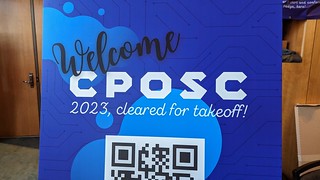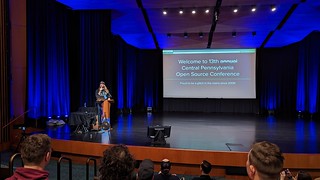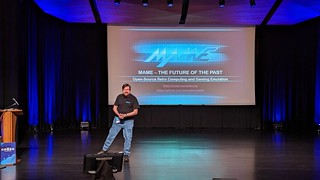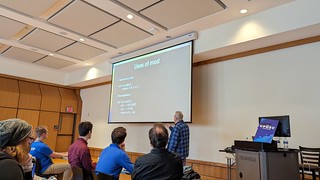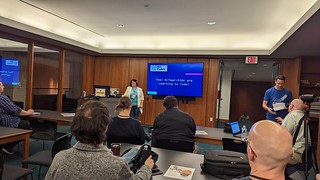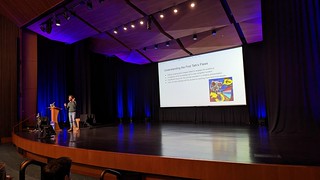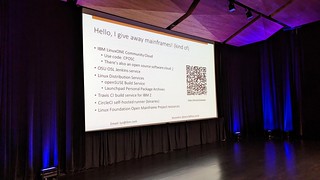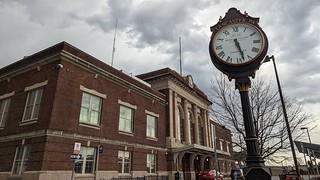In 2009 MJ and I drove out to the Central Pennsylvania Open Source Conference in Harrisburg, Pennsylvania. I was still living in the suburbs of Philadelphia at the time, and was excited to participate in the Ubuntu booth and give my first conference talk! I’d given talks at the local Philadelphia Linux User Group, but never at a real conference. I was extremely anxious, and even dressed in a button-down shirt and slacks. I need to remind myself of this when I see young people at conferences as I parade around in my hoodie and jeans proclaiming that we don’t need to dress up. I was once that young person looking to be taken seriously by all the professional adults too. If you want to read more about my experience at that conference, I wrote about it here: CPOSC 2009 wrap-up and an interview.
I moved to California just a few months later, during one of the snowiest winters Philadelphia had seen in years. I was aware of CPOSC continuing over the years, but I could never sync up my visits back with the conference. This year serendipity stepped in. I just happened to discover via a chat in #plug a week and a half prior that CPOSC was happening during our visit to Philadelphia. Even better, they were still accepting applications for lightning talks. I swiftly submitted something (which was accepted!) and started making arrangements to attend. It was on a Saturday, but thankfully MJ had a friend in town who wanted time with the boys, so it wasn’t a big deal for me to sneak out for a day.
Friday night I attended a musical with some friends downtown, stayed the night in a hotel in Philadelphia, and then was up bright and early the next morning to catch my Amtrak train to Lancaster, where CPOSC was now based. Unfortunately it was a little rainy that day, so I got a little damp on my walk to the station, and then had to take an Uber from the station in Lancaster to the venue, but it all worked out. I was at CPOSC in time to catch the tail end of the provided breakfast refreshments and to say hello to some friends before the opening remarks.
The first talk was on “MAME – The Future of the Past (Open-Source Retro Computing and Gaming Emulation)” by Gregory Ember. This was one of my favorite talks of the event. While I may not have a lot of time for games these days, I do love them, and I really love geeking out about retro emulation tech. His talk gave a bit of a history of the project, which provided glimpses into some of the fascinating problems they’ve encountered and overcome. Fortuitously, he made an off-hand comment about mainframes, which gave me an opening to chat with him later and we were able to connect on social media post-event. Cool! I’m totally going to carve out some time to play with MAME.
Then I joined a packed room for a talk by my friend Walt Mankowski on “Remedial Math for Programmers” which I remember cheering him on for when he submitted his talk. In my case, about half the “remedial math” he was talking about was stuff I never actually learned because I didn’t go to school for computer science (I didn’t go to college or university at all). So it was a refresher for a few things, but some of the concepts were entirely new to me. I loved his style of presenting it with examples though, since it made it so much easier for me to understand.
The final talk before lunch was from Deanna Bledsoe on “8-Year-Olds are Learning to Code!” and she gave a great tour of the landscape today for younger folks learning how to code. I had been passingly familiar with Scratch and code.org, but it had been a while since I’d looked at any of it, and that was all before I became a parent. I didn’t really need an excuse to strike up a conversation with her, so it was a real delight when I saw her in the hallway later and we were able to talk about our shared interest in getting kids into STEM for a few minutes. I also used my time in the “hallway track” to chime into a conversation about package management, which folks came and went from and then ended up talking about amateur radio. It was during this discussion that I remembered what I missed so much about in-person conferences: those random, geeky personal connections. I’m shy, and half the people I was talking to I’d just met, but in that moment we were all just geeking out over topics we either had expertise or interest in. It’s so nice to be back to doing events. Just prior all that, I attended a talk by Tom Swartz on “Open Source Home Automation” where he focused on Home Assistant, and I was really glad to hear (and see!) that they’ve made some really great advances in the past couple years, it may be time for me to play around with it again.
If I had to say there was a them to my afternoon, it was AI. The first talk after lunch was “An AI Wrote This Talk” by Tom Swartz and it was an incredibly entertaining romp through the power, and shortcomings of ChatGPT and other LLM technologies out there, for now. We still need human intervention to truly make something engaging that connects to people, but how far are we away from a world where it’s not? This dovetailed nicely with the final talk of the day, from Richard Everts, on “What is Really Happening Right Now With AI”. Want to be scared a bit? I joked that it wouldn’t be an open source conference without a scary AI talk, and while he did have some bright spots, the general tone of the talk was a bit dystopian. There are some real concerns out there about the rapid progression of machine learning technologies. We may not have to worry about robots for a while, but deep fakes are already altering our perception of the world, and there really is no closing Pandora’s Box. In more localized concerns, routine programming tasks may be very well suited to AI, so our expertise in the technology realm may be going up a rung on the ladder. But I thought about this a lot on my train ride home, hasn’t this always been the case? As our tools and hardware advance, so do we. None of us are swapping out vacuum tubes or writing code for punched cards anymore. Plus, with every advance in technology, we’re able to do so much more! The folks breaking codes with early computers in WWII couldn’t dream of what would be happening in the world of computing just half a century later, let alone now. When we free up the humans from doing tedious tasks and offload that to computers, that allows us to focus on more interesting, complex problems. I wouldn’t say I’m an eternal optimist, but at the same time it’s nice for talks like this to knock some perspective into me every once in a while. Still, I’m going to cling to the positive in this case, because doing otherwise leads to a dark future that I’d struggle to live with.
The last part of the actual conference was the round of lightning talks, it was my time to hop up on stage! Admittedly, I’d been talking about mainframes to anyone who would listen all day, but the big stage was a nice chance to get spiel out to everyone who stayed long enough for them. Plus, I got to use a few moments of my talk time to gush about coming back to CPOSC after over a decade.
Sadly, I had to rush out as soon as I finished my talk, since I had a train to catch back to Philadelphia. I lucked out on timing though, since it started drizzling just as I got to the station, and the thunderstorm began while I was standing on the platform waiting for the train.
The thunderstorm really picked up steam while I was riding back, and it was glorious. I had a paper book in hand and listening to a storm while on a train is pure bliss. Unfortunately the storm also caused some power outages, which got us stuck for a bit in downtown Philadelphia, and so I was over an hour late coming into the next station, which should have been about 20 minutes from there. Plus, Uber had surge pricing due to lots of people being stuck in the rain, so my ride home from the station was quite a bit more pricey than I had anticipated. Still, I arrived back in time to scoop the boys out of the bath and help put them to bed. It was a long day, but worth it.
It’ll be several months before my next generalist open source conference. The pandemic is not over, and I doubt my travel schedule will go back to what it was pre-pandemic any time soon. A lot has changed with the world and the work I do in the past three years.


